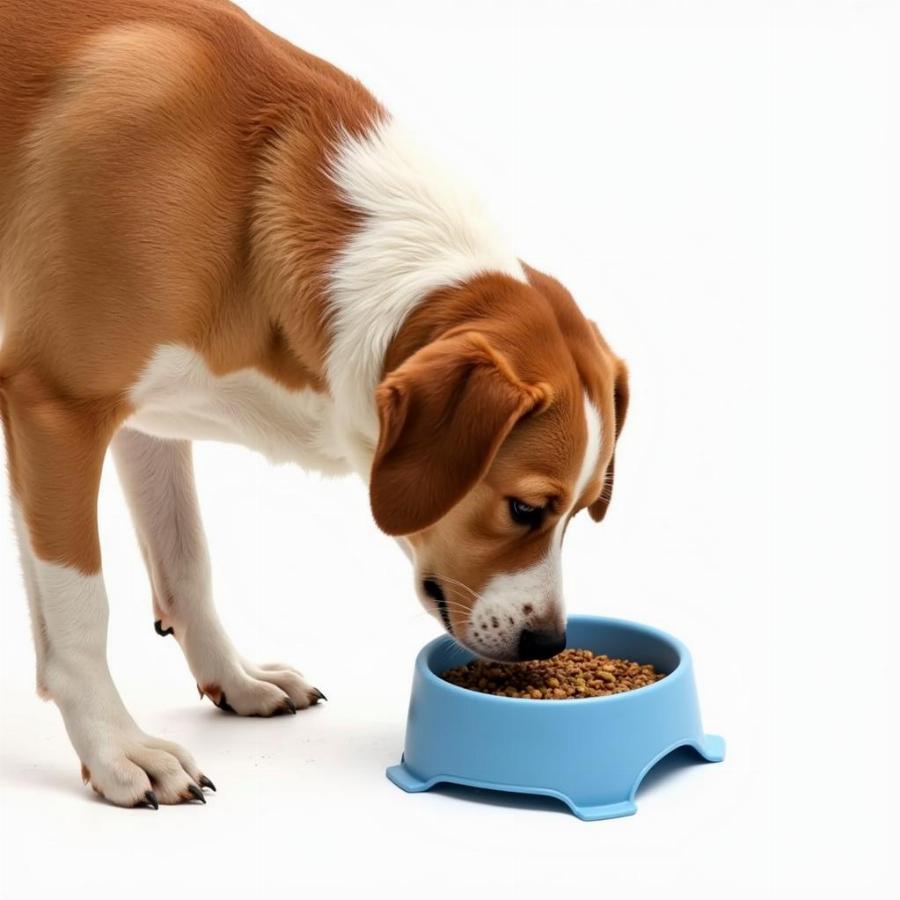Gas in dogs, much like in humans, is a normal part of the digestive process. While occasional flatulence is nothing to worry about, excessive or particularly foul-smelling gas can indicate underlying dietary issues or even medical conditions. This guide will delve into the causes of dog gas, explore when it becomes a concern, and offer solutions, including discussing the use of over-the-counter medications like Gas X for dogs. Understanding how to manage your dog’s digestive health is a key component of responsible pet ownership.
Understanding the Causes of Dog Gas
Several factors contribute to gas production in dogs. Diet plays a significant role, with certain foods being more likely to cause gas. Foods high in fiber, like beans and certain vegetables, can ferment in the gut, leading to increased gas. Similarly, foods containing lactose, which many dogs have difficulty digesting, can also be culprits. Rapid eating or swallowing air can also introduce excess gas into the digestive system. Medical conditions such as inflammatory bowel disease or exocrine pancreatic insufficiency can also manifest as increased gas production.
One common misconception is that giving human gas medication, like Gas X (simethicone), is a safe and effective way to alleviate gas in dogs. While simethicone is generally considered safe for humans, its efficacy and safety in dogs haven’t been extensively studied. Always consult with your veterinarian before giving your dog any human medication, including Gas X.
When to Worry About Dog Gas
While occasional flatulence is normal, persistent, excessive, or particularly smelly gas warrants attention. If your dog’s gas is accompanied by other symptoms like vomiting, diarrhea, loss of appetite, or abdominal pain, it’s essential to seek veterinary attention promptly. These symptoms could indicate a more serious underlying issue requiring diagnosis and treatment. Changes in your dog’s eating habits, like scavenging or eating garbage, can also lead to increased gas and potential health problems.
Managing Dog Gas: Dietary and Lifestyle Changes
Often, simple dietary and lifestyle changes can significantly reduce dog gas. Switching to a high-quality dog food formulated for sensitive digestion can be helpful. Ensure your dog eats slowly by using puzzle feeders or slow-feed bowls, which can reduce air intake. Avoid feeding table scraps, especially those containing gas-inducing ingredients. Regular exercise can also aid digestion and help prevent gas buildup.
If you suspect food allergies are contributing to your dog’s gas, discuss an elimination diet with your veterinarian. This involves feeding your dog a limited ingredient diet to pinpoint the specific allergen. Never abruptly change your dog’s diet as this can worsen digestive issues. Gradual transitions are key to maintaining a healthy gut.
 Dog Eating From a Slow-Feed Bowl
Dog Eating From a Slow-Feed Bowl
Veterinary Intervention and Alternatives to Gas X
If dietary and lifestyle changes don’t resolve the issue, consult your veterinarian. They can diagnose any underlying medical conditions contributing to the gas. They might also recommend specific probiotics or digestive enzymes to support gut health. While Gas X isn’t typically prescribed for dogs, your vet can suggest safe and effective alternatives to address the problem. Remember, self-treating your pet can be dangerous, so always seek professional guidance.
Conclusion: Addressing Canine Gas Effectively
Excessive gas in dogs can be more than just an unpleasant odor; it can signify underlying health concerns. By understanding the causes of dog gas and implementing appropriate dietary and lifestyle changes, you can help your furry friend enjoy a more comfortable digestive experience. While Gas X might seem like a quick fix, it’s crucial to consult with your veterinarian before giving your dog any human medication. Prioritizing your dog’s health and well-being is essential for a happy and harmonious relationship.
FAQ:
-
Can I give my dog Gas X for gas? It’s best to consult with your veterinarian before giving your dog any human medication, including Gas X.
-
What can I feed my dog to reduce gas? High-quality dog food formulated for sensitive digestion can often help. Avoid table scraps and known gas-inducing ingredients.
-
When should I be concerned about my dog’s gas? Persistent, excessive, or foul-smelling gas, especially when accompanied by other symptoms, warrants veterinary attention.
-
Are there natural remedies for dog gas? Regular exercise, slow-feed bowls, and a balanced diet can be effective natural remedies.
-
What are the possible medical causes of excessive gas in dogs? Medical conditions like inflammatory bowel disease or exocrine pancreatic insufficiency can contribute to gas.
-
Can probiotics help with dog gas? Probiotics can support gut health and may help reduce gas. Consult your vet for recommendations.
-
What if dietary changes don’t help with my dog’s gas? If dietary changes are ineffective, consult your veterinarian to explore other potential causes and treatment options.
Further Reading:
- Learn more about what is DA2PP for dogs.
- Find out the normal resp rate in dogs.
- Discover if dogs can eat dried bananas.
Beaut Dogs is your trusted source for all things canine, offering expert advice and comprehensive information on dog breeds, care, and well-being. For personalized guidance and answers to your dog-related questions, email us at [email protected]. Beaut Dogs is dedicated to empowering dog owners with the knowledge and resources they need to provide the best possible care for their beloved companions. Visit us at https://beautdogs.com.